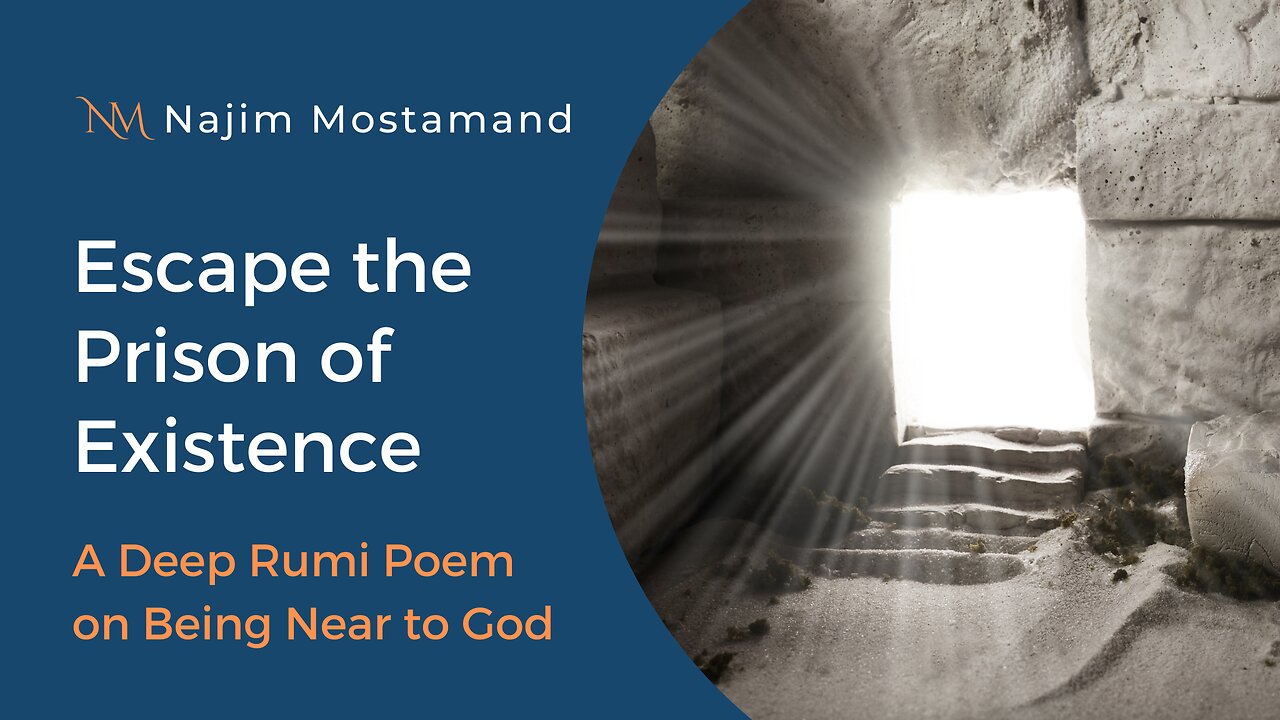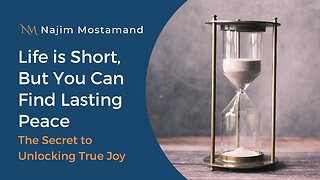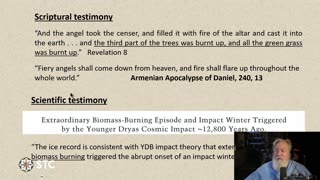Premium Only Content

Escape the Prison of Existence – A Deep Rumi Poem on Being Near to God
Join me on this exploration into the mesmerizing world of Rumi's spiritual poetry, as we delve deep into his mystical poem, "Escape the Prison of Existence."
In this deep Rumi poem, we'll explore the profound wisdom behind not only Rumi's words, but also that of Prophet Muhammad ﷺ, while uncovering the timeless truths hidden within.
Get ready to expand your understanding of existence, nonexistence, and the ultimate quest for being near to God. As we journey through this Rumi gem, we'll explore the profound implications of escaping the prison of existence and the treasure found in nonexistence.
Whether you're a Rumi enthusiast, a seeker of spiritual wisdom, or simply curious about the profound teachings of this renowned mystic poet, this video will captivate your mind and touch your soul.
Don't miss out on this illuminating exploration of Rumi's poetry and the profound insights that can enrich your spiritual journey.
Thank you for watching, and please don't forget to like and subscribe if you enjoyed the video.
Sending peace and love to all!
#rumi #rumipoetry #rumipoem
---
If you are looking for more guided meditations, spiritual poetry, and ancient wisdom for awakening, please subscribe to my YouTube channel and follow me on social:
https://www.youtube.com/c/NajimMostamand
Website: https://najimmostamand.com/
Instagram: https://www.instagram.com/najimmostamand/
Facebook: https://www.facebook.com/najimmostamand1/
Patreon Donation Page: https://www.patreon.com/najimmostamand
Medium: https://medium.com/@namostamand
© 2023 Najim Mostamand
Music by Cousin Silas ("Fading History" and "Different Sky")
Check out Dave's incredible music here:
https://cousinsilas1.bandcamp.com/
https://soundcloud.com/cousin-silas
This video is dedicated to God and all His wonderful glory. May His endless light, love, and wisdom continue to guide us all back Home.
---
The Prophet said, "Don't think of my ascension
as superior to that of Jonah:
mine was up to heaven; his was below into the belly of the fish,
but nearness to God is beyond calculation."
Nearness to God is neither up nor down:
to be near God is to escape the prison of existence.
What room has nonexistence for "up" or "down"?
Nonexistence has no "soon" or "far" or "late."
The laboratory and treasure house of God is in nonexistence.
Since existence deludes you,
how will you know what nonexistence is?
~ Maulana Jalaluddin Rumi
---
Rumi, born Jalal ad-Din Muhammad Balkhi, was a 13th-century Persian poet, Islamic jurist, and theologian who is widely regarded as one of the greatest spiritual poets in history. He was born on September 30, 1207, in Balkh, in present-day Afghanistan, and later settled in Konya, in present-day Turkey, where he spent most of his life.
Rumi's early years were marked by his father's influence, who was a prominent Islamic preacher and theologian. Rumi grew up immersed in the teachings of Islam and became well-versed in various branches of Islamic knowledge, including jurisprudence, theology, and Sufism. However, his life took a transformative turn when he met the wandering dervish Shams Tabriz, who became his spiritual mentor and kindled in him a deep longing for divine union.
Rumi's spiritual journey with Shams Tabriz inspired him to write poetry as a means to express his profound mystical experiences and deep yearning for God. His poetry, written in Persian, is renowned for its spiritual depth, eloquence, and universal appeal. Rumi's poetry is characterized by themes of love, divine longing, union with God, and the quest for inner illumination. His words have the power to transcend cultural, religious, and linguistic boundaries, resonating with people of different faiths and backgrounds across the world.
Rumi's most famous work is his Masnawi, a collection of poetic stories, parables, and teachings that span over 25,000 verses. The Masnawi is considered a spiritual masterpiece and is often referred to as the "Quran in Persian." Rumi's poetry reflects his belief in the power of love as the ultimate path to God and emphasizes the importance of transcending superficial differences and connecting with the divine essence within oneself and others.
Rumi's poetry has had a profound impact on millions of people around the world, transcending time and culture. His words continue to inspire seekers of truth and lovers of God to this day, reminding them of the eternal beauty of divine love and the transformative power of spirituality. Rumi's legacy as a spiritual poet and mystic continues to shine brightly, serving as a guiding light for those on the path of spiritual awakening and enlightenment.
-
 8:22
8:22
Najim Mostamand
5 months agoLife is Short, But There's Something More Permanent...
532 -
 1:30:04
1:30:04
Steve-O's Wild Ride! Podcast
3 days ago $7.07 earnedHardy Is Taking Over Country Music - Wild Ride #246
58.8K3 -
![🔴LIVE-MARVEL RIVALS [1ST LOOK]❗ #MGGA #RUMBLEGAMING #RUMBLETAKEOVER](https://1a-1791.com/video/s8/1/f/N/y/K/fNyKv.0kob-small-LIVE-MARVEL-RIVALS-1ST-LOOK.jpg) 4:39:53
4:39:53
Fragniac
16 hours ago🔴LIVE-MARVEL RIVALS [1ST LOOK]❗ #MGGA #RUMBLEGAMING #RUMBLETAKEOVER
23.3K6 -
 9:20
9:20
Colion Noir
19 hours agoArgentine President Lowers Gun Purchase Age to 18, Why The U.S. Should Do The Same
81K40 -
 1:49:07
1:49:07
Adam Does Movies
19 hours ago $2.66 earnedKraven Movie Review + The Lord of the Rings: The War of the Rohirrim - LIVE!
41.4K2 -
 21:59
21:59
BlackDiamondGunsandGear
13 hours ago $1.42 earned🔴 NEW Ruger RXM / RANGE Review / Plaid Joshie Approved?
26.8K11 -
 1:33:50
1:33:50
Squaring The Circle, A Randall Carlson Podcast
1 day ago#031 Apocalypse Unsealed - Squaring The Circle: A Randall Carlson Podcast
22.9K7 -
 1:01:47
1:01:47
Trumpet Daily
2 days ago $10.92 earnedChris Wray Lied About January 6 - Trumpet Daily | Dec. 13, 2024
24.5K18 -
 55:42
55:42
Bek Lover Podcast
15 hours agoDemonic Deception Incoming!
14.8K17 -
 37:13
37:13
TampaAerialMedia
1 day ago $0.43 earnedBOSTON Travel Guide - Tours, Tips, Trails, & Transportation
11.8K3